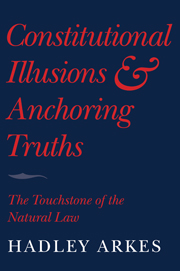Book contents
- Frontmatter
- Contents
- Acknowledgments
- INTRODUCTION: The Anchoring Common Sense and the Puzzles of the Law
- ONE On the Novelties of an Old Constitution: Settled Principles and Unsettling Surprises
- TWO The Natural Law – Again, Ever
- THREE Lochner and the Cast of Our Law
- FOUR The Strange Case of Prior Restraint: The Pentagon Papers
- FIVE Near Revisited
- SIX The Saga of Frank Snepp and the New Regime of Previous Restraints
- SEVEN And Yet…A Good Word on Behalf of the Legal Positivists
- EIGHT Conclusion and Afterword
- Index
- References
TWO - The Natural Law – Again, Ever
Published online by Cambridge University Press: 05 June 2012
- Frontmatter
- Contents
- Acknowledgments
- INTRODUCTION: The Anchoring Common Sense and the Puzzles of the Law
- ONE On the Novelties of an Old Constitution: Settled Principles and Unsettling Surprises
- TWO The Natural Law – Again, Ever
- THREE Lochner and the Cast of Our Law
- FOUR The Strange Case of Prior Restraint: The Pentagon Papers
- FIVE Near Revisited
- SIX The Saga of Frank Snepp and the New Regime of Previous Restraints
- SEVEN And Yet…A Good Word on Behalf of the Legal Positivists
- EIGHT Conclusion and Afterword
- Index
- References
Summary
A dear friend, who has done premier work in the neural sciences and several books on philosophical psychology, remarked that he wanted, as the epitaph on his gravestone, “He died without a theory.” A former colleague of mine remarked that I had a “theory” of natural law. But I can join my friend in saying that I, too, have no “theory.” To say that someone has a “theory” of natural law is to suggest that an observer, looking on, can see played out before him people seized with “theories” – that he may stand there, in a wholesome detachment, seeing theories of various sorts whizzing past. From that vantage point we are encouraged to make judgments about the theories, or fragments of theories, that are plausible or implausible, right or wrong, true or false. I said then: Just tell me the ground on which you are making those judgments about the theories that are plausible or implausible, true or false, and you would have been led back to the ground of what I understand as the natural law. For you would have been led back to the ground on which we have confidence in the things we can truly know about the properties of propositions, about the statements that are true and false, and finally, then, about the things that are morally right or wrong. You would be led back to what Blackstone called “the laws of reason and nature.”
- Type
- Chapter
- Information
- Constitutional Illusions and Anchoring TruthsThe Touchstone of the Natural Law, pp. 43 - 78Publisher: Cambridge University PressPrint publication year: 2010

